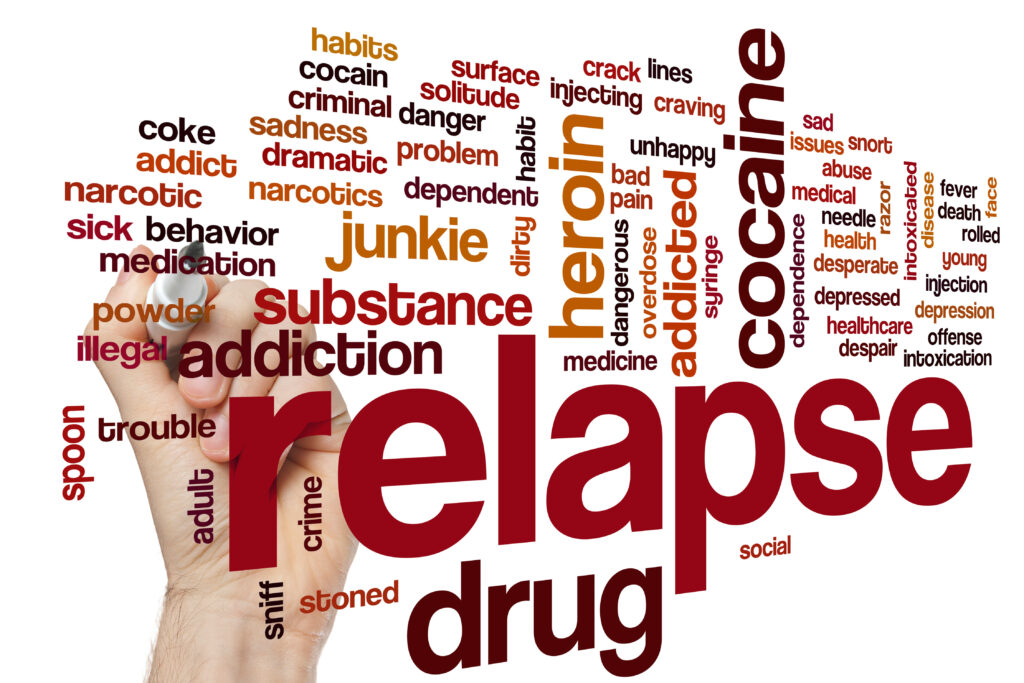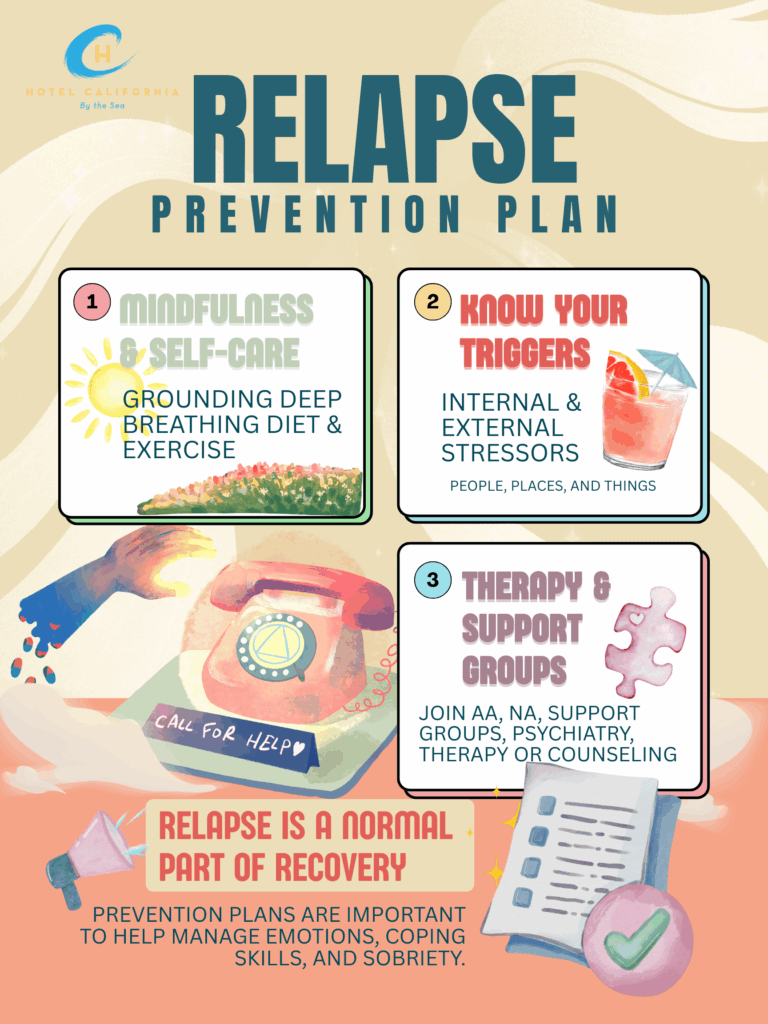What is a Relapse Prevention Plan?
A relapse prevention plan is created during the recovery process to help clients effectively manage and navigate their situation when they are faced with the possibility of relapsing on drugs. Relapse prevention plans incorporate the use of effective coping skills, recovery tools and practicing mindfulness to reduce the likelihood of a drug relapse.

Relapse. Contrary to popular belief, relapse is a normal part of substance addiction recovery. Some say the normalization of relapse can imply a reduced sense of urgency for providers and patients to prevent it from occurring. Others believe relapse is part of the process of recovery because addiction can be one of the most difficult mental health diseases to overcome.
Drug relapse can lead to a variety of negative outcomes. It can cause loss of employment, it can cause loss of career, it can hinder family relationships and it can impede on personal freedom.
A relapse prevention plan isn’t just about how to not drink or not do drugs. It is about implementing learned skills and techniques that help regulate emotions and behaviors. It is about learning how to replace unhealthy behaviors associated with your addiction with healthier habits. Relapse prevention plans are individualized based on each patient.
What are the stages of Relapse?
The act of relapsing is a process. There are three main stages a person goes through when they relapse on substances.
The emotional relapse stage. This occurs when a person is reminded of their last relapse episode and is determined not to repeat it. However, their emotional well-being results in thoughts and behaviors that create the foundation for the next relapse. During this stage, because they are not planning to relapse, they may be in denial of their risk. This denial can prevent the use of effective coping skills to prevent the progression toward relapse.
Some signs of emotional relapse include failing to attend more support group meetings, focusing on other people’s problems, poor sleep and eating habits. During this step, the main goal is to help patients understand the importance of self-care and then recognize that they may be in denial.
The mental relapse stage. During this period, there is an internal struggle between the desire to resume using drugs and the desire to remain abstinent. Signs of mental relapse include thinking about people and places associated with drug use, exaggerating positive aspects of drug use, lying, bargaining, trying to plan ways to use the drug while still being in control and seeking out opportunities to use the drug again. In this stage, it is important to help patients recognize this feeling and avoid situations that can increase the risk of physical relapse.
The physical relapse stage. This is the final stage of addiction relapse, when the patient resumes using substances. Oftentimes, physical relapse occurs during a time in which the patient believes their drug use will go undetected or unnoticed by others.

Relapse Prevention Plan
What is a relapse prevention plan? It is an individualized treatment care plan implementing coping techniques to help manage triggering emotions associated with addiction. Some strategies include cognitive therapy sessions, skill development to help start a new career or hobby, meditation for self-care and constant monitoring and reevaluation. This all-around approach to recovery can help patients successfully navigate relapse prevention.
Most often, people focus on relapse in terms of the consumption of alcohol or drugs that have been problematic. But, consumption is the very last step in the relapse process. Neglecting earlier events and behaviors can prevent effective intervention at earlier stages.
There is also a misconception that relapse prevention plans should only be used when someone is having an active desire to relapse on drugs. This is not true. Relapse prevention skills should be implemented into each person’s daily routine to prevent and reduce the risk of relapse.
Relapse Prevention Strategies
- Mindfulness. Researchers have found that mindfulness-based techniques can be very effective for the treatment of recovery. It helps to reduce cravings by focusing on the present and engaging in activities that restore the same level of calmness. Mindfulness exercises can help us pay closer attention to the thoughts and feelings we are experiencing in the moment without judgment. The purpose is to grow more familiar and ok with recurring thoughts that can trigger us and how to more effectively respond to them.
- Changing fear. Fear is part of a negative thinking pattern in addiction. It can be a fear of not measuring up. Fear of being judged. Fear of feeling like an impostor. Fear or relapse. And fear of success. Changing our mindset about fear can help better prevent risks for relapse.
- Redefining what is fun. Clinical studies have shown, when clients are under stress, they tend to glamorize their past due to longing and nostalgia. They begin to think recovery is too much work and addiction was fun. They begin to downplay the negative consequences of addiction. Changing this way of thinking will help reduce the risk of relapse.
- Setbacks. Setbacks during recovery happen. How you deal with setbacks can contribute greatly to your recovery. A setback is a behavior that moves a person closer to physical relapse. Examples of setbacks are not setting health boundaries and not asking for help. They are caused by a lack of learned coping skills or a lack of planning. Learning from setbacks can help you manage your risk of relapse.
- Self-care. Self-care activities like physically being active, improved sleep and having a well-balanced, nutrient-dense diet can help you heal physically. This physical change can set you up for success when navigating the risk of relapse.
- Grounding techniques. Stress and anxiety are some of the biggest hurdles to overcome when it comes to recovery. A grounding technique called 5-4-3-2-1 is a coping skill that takes you through 5 senses to help you focus on the present and avoid thoughts of using drugs or alcohol.
- Deep breathing. Learning to control your breathing can impact your overall brain chemistry and affect your emotions to help you regulate your mood. Deep breathing helps to release neurotransmitters in the brain that can trigger feel-good chemicals. This results in relaxation, calmness and happiness.
- HALT. Hungry, angry, lonely and tired. When you have a craving or urge to relapse and use drugs, ask yourself if you are experiencing any of the previous emotions. Do a regular inventory of them to keep yourself accountable.
- Know your triggers. Internal stressors like anger and external stressors like people, places and things can all be triggering. By learning them and being aware of them, it can make it easier to learn how to cope with them and manage the risk of relapse.
- Join a support group like AA, NA, SMART or other addiction support recovery groups.
- Get professional help. See a therapist, psychiatrist, counselor or psychologist.
Check Your Insurance Coverage for FREE
Find out if your insurance covers addiction treatment in minutes. We accept most insurance!
Risk Factors of Drug Relapse
- Low self-efficacy
- Lack of motivation to positive changes
- Insufficient adaptive coping skills
- Inadequate social and emotional support
- Cravings and urges to use drugs
- Maintaining contact with people associated with your drug use
- Being in the presence of substances
- Spending time in places where you used substances
- Isolation from others
- Not reaching out for support
- Having unrelated physical or mental health issues
- Boredom
- Living in a place with high levels of substance use
- Being exposed to substance use in a professional or personal environment
- Withdrawal and PAWS
- Poor self-care
- Pride and overconfidence
Reach out to Hotel California by the Sea
We specialize in treating addiction and other co-occurring disorders, such as PTSD. Our Admissions specialists are available to walk you through the best options for treating your addiction.
Treatment for Substance Use Disorder
Relapse is a normal part of the recovery process. In recovery, as time goes on, some people tend to focus less on self-care and begin taking on more and more responsibilities. This can become overwhelming and lead them back into old habits and behaviors related to their drug use. In other cases, patients are not learning any new coping skills to help them effectively manage their triggers. These are just some examples of factors that can cause a high risk of relapse.
Relapse prevention plans are designed to help patients manage and cope with their emotions related to their addiction and find alternative, healthier ways to deal with them. Behavioral health treatment programs such as Hotel California by the Sea provide a comprehensive care plan that encompasses the development and utilization of relapse prevention plans.
We provide treatment at all levels of care including detox, residential, PHP and IOP. We utilize evidence-based treatment methods such as CBT, DBT and group therapy. Hotel California by the Sea is dedicated to helping clients reach their goals in recovery and overcome their addiction.
References:
https://www.ncbi.nlm.nih.gov/books/NBK551500
https://www.hazeldenbettyford.org/relapse-prevention
https://pmc.ncbi.nlm.nih.gov/articles/PMC4553654
https://www.addictioncenter.com/community/top-10-relapse-prevention-skills
https://www.va.gov/WHOLEHEALTHLIBRARY/tools/reducing-relapse-risk.asp
https://www.addictionsandrecovery.org/relapse-prevention.htm
